By Sam Litvin

SAN DIEGO — The racism and history of Hollywood isn’t anything new. Just a couple of years ago, we were made to see the issues not only with casting but also awards in the “Oscars So White.” While impact on Asian and Black roles is clear and obvious, not so obvious is its impact on people of other minorities who are said to be “white passing.”
A few decades ago, it was common that parts were passed over because someone is too ethnic or the roles that are stereotypical and tokenizing in nature. Jewish and Italian actors that wanted to be taken seriously often changed their names or even undertook plastic surgery to alter their ethnic appearance.
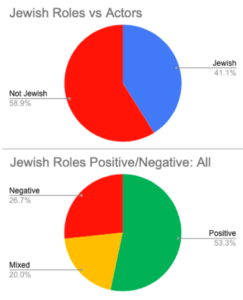 Of course, it is one thing to deny an ethnic person a role for a white character, and a completely another to deny them a role for a character that is of that ethnicity. The effect of this role denial is something is known in every minority community but because it is a common trope to say that “Hollywood is controlled by Jews,” in spite of all the historical evidence of Jews being excluded and having to hide their Jewishness to be included in films, Jews are considered to be immune from the discrimination in Hollywood.
Of course, it is one thing to deny an ethnic person a role for a white character, and a completely another to deny them a role for a character that is of that ethnicity. The effect of this role denial is something is known in every minority community but because it is a common trope to say that “Hollywood is controlled by Jews,” in spite of all the historical evidence of Jews being excluded and having to hide their Jewishness to be included in films, Jews are considered to be immune from the discrimination in Hollywood.
This discrimination is easy to hide with anecdotes of Jewish actors playing Jewish roles, even when Time Magazine articles come out that looked at the trend of Jewish leading roles going to non-Jewish actresses while the stereotypical roles go to Jewish actors. This is something that Sarah Silverman was one of the first to mention on Howard Stern and then later again on her own podcast. However, because the critics bring up individual films and roles, their critiques are easily dismissed by mentioning some of the leading roles that are played by Jewish actors. Therefore, an overview of the roles in a more scientific way can sometimes shed more truth on an issue and also silence some of the more rational critics.
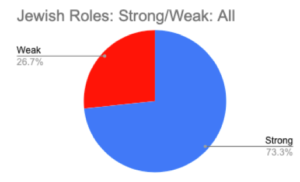 I looked at the IMDB Jewish Films as well as the Holocaust films and Wikipedia and any other films I could find. I compiled a list of 66 films, far more than the 30 needed to create a statistically significant sample size and I found that the Sarah Silverman hypothesis appears to be true and can be called the “Sarah Silverman Theory of American Antisemitism in Films and Roles.” However, data unlike anecdotes can answer more questions and raise more questions than one originally looked for.
I looked at the IMDB Jewish Films as well as the Holocaust films and Wikipedia and any other films I could find. I compiled a list of 66 films, far more than the 30 needed to create a statistically significant sample size and I found that the Sarah Silverman hypothesis appears to be true and can be called the “Sarah Silverman Theory of American Antisemitism in Films and Roles.” However, data unlike anecdotes can answer more questions and raise more questions than one originally looked for.
 First is first. It is true. Jews are less likely to be cast in Jewish leading roles. Overall, Jewish characters that are portrayed in films are more positive and strong than they are weak and negative. Yet the roles that are given to Jewish actors are more likely to be ones that are seen as weak or negative, thus re-enforcing stereotypes.
First is first. It is true. Jews are less likely to be cast in Jewish leading roles. Overall, Jewish characters that are portrayed in films are more positive and strong than they are weak and negative. Yet the roles that are given to Jewish actors are more likely to be ones that are seen as weak or negative, thus re-enforcing stereotypes.
 Nearly 60% of Jewish leading roles go to non-Jewish actors, that about 50% of those roles are positive depictions, and that 73% of those roles depict strong characters.
Nearly 60% of Jewish leading roles go to non-Jewish actors, that about 50% of those roles are positive depictions, and that 73% of those roles depict strong characters.
Non-Jewish actors are much more likely to be playing strong roles than Jewish weak roles, reinforcing the weak-Jew stereotype.
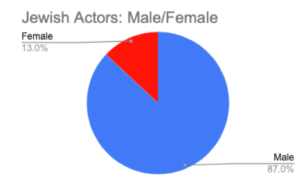 Gender also plays a part. Since Sarah Silverman focused on women’s roles, it is important to look if there was any impact of gender on the roles, and boy was there. Not only are there far fewer roles for Jewish women as there are fewer Jewish women’s roles (18% to 82%), but the ones which had non-Jewish actresses were all strong while 66% of Jewish roles with Jewish actresses were strong.
Gender also plays a part. Since Sarah Silverman focused on women’s roles, it is important to look if there was any impact of gender on the roles, and boy was there. Not only are there far fewer roles for Jewish women as there are fewer Jewish women’s roles (18% to 82%), but the ones which had non-Jewish actresses were all strong while 66% of Jewish roles with Jewish actresses were strong.
 Then while 90% of all women’s Jewish characters were positive, when played by Jewish actresses, that percentage went down to 67% while remaining 90% for non-Jewish actresses.
Then while 90% of all women’s Jewish characters were positive, when played by Jewish actresses, that percentage went down to 67% while remaining 90% for non-Jewish actresses.
Eighty-seven percent of all Jewish roles are male roles.
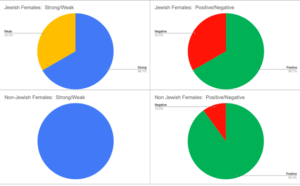 Most Jewish female characters are presented positively (90%) and as strong (90%).
Most Jewish female characters are presented positively (90%) and as strong (90%).
However, when acted by Jewish actresses, they were 33% likely to be weak versus 0% for non-Jewish actresses, and 33% negative versus only 10% for non-Jewish actresses.
However, the data does not show something that is even more pernicious. Something that is more difficult to quantify but anyone looking closer at the roles will see that the roles played by non-Jewish actors will often go out of their way to erase the Jewishness of the roles. This shouldn’t be surprising given the general ignorance about who Jewish people are, that most actors playing a role will rarely do more research than cursory look at Jewish holidays.
One example of this erasure is the role of Kenneth Feinberg in Worth, played by Michael Keaton. Keaton completely erased the Jewishness of the character. Gone from the role was any semblance of the New York Jew that can be seen in the actual person. In fact, one would not know the character is Jewish if not for the one antisemitic insult made during the movie.
 Then there is a movie like Awakenings with Robin Williams. Jewish-passing actors like Robin Williams and Ben Kingsley have stolen more Jewish roles than matzah on Passover. In this film, the writers go out of their way to erase all Jewishness from the real-life character Oliver Sacks who discovered the cure to the horrible locked-in syndrome.
Then there is a movie like Awakenings with Robin Williams. Jewish-passing actors like Robin Williams and Ben Kingsley have stolen more Jewish roles than matzah on Passover. In this film, the writers go out of their way to erase all Jewishness from the real-life character Oliver Sacks who discovered the cure to the horrible locked-in syndrome.
The film changed the name of Sacks and then in the ending credits went on to further the lie by saying that Dr. Sayer, not Dr. Sacks continues to practice medicine, erasing the Jewishness of the person and thus their contribution to America.
The epilogue of the film Awakenings, based on the book by the same name written by Dr. Oliver Sacks, in effect erases the history of Dr. Sacks, his name, and replacing it with a fictional Dr. Sayer.
So why is this important? Well, it answers why the are stereotypes of Jews continue to exist. It is because of movies like Madoff and Dopesick where Jewish characters are evil while in movies like Worth or Awakenings their Jewishness is erased, or The Marvelous Mrs. Maisel where the Jewishness is used worn like an ornament or a Halloween costume.
 Laurie Baron, a San Diego State University professor emeritus and expert on Jewish films, said, “I don’t think it’s as serious an issue as whites being cast as Asians, hearing people as deaf people, straight people playing gay or trans roles, or whites in blackface playing blacks. But clearly Hollywood avoided casting actors with overtly Jewish looks or mannerisms or casting them in overtly Jewish roles until the 1960s and 1970s, when the rise of ethnic identity politics made that hip, in the cases of actors like Streisand, Allan, Brooks, Jeff Goldblum, and Carol Kane.”
Laurie Baron, a San Diego State University professor emeritus and expert on Jewish films, said, “I don’t think it’s as serious an issue as whites being cast as Asians, hearing people as deaf people, straight people playing gay or trans roles, or whites in blackface playing blacks. But clearly Hollywood avoided casting actors with overtly Jewish looks or mannerisms or casting them in overtly Jewish roles until the 1960s and 1970s, when the rise of ethnic identity politics made that hip, in the cases of actors like Streisand, Allan, Brooks, Jeff Goldblum, and Carol Kane.”
Henry Bial, a University of Kansas professor and author of the book Acting Jewish, feels that part of the issue is in the American view that Jews are a religion, not an ethnicity. According to Bial, “Hollywood is invested in American Jewishness being a religion.”
 This investment is actually tied to antisemitism and even the Holocaust. “If we reach back historically, 1950ies we can already see it, its part of an explicit project, where Hollywood is establishing that Jews are white people and if Jews are white people, then its fine for Jews to play white people and for white people to play Jews. When coming out of the Holocaust there was significant effort to establish our whiteness. That’s the backdrop to this,” said Professor Bial.
This investment is actually tied to antisemitism and even the Holocaust. “If we reach back historically, 1950ies we can already see it, its part of an explicit project, where Hollywood is establishing that Jews are white people and if Jews are white people, then its fine for Jews to play white people and for white people to play Jews. When coming out of the Holocaust there was significant effort to establish our whiteness. That’s the backdrop to this,” said Professor Bial.
Regardless of how the current issue came about, the problem with refusing to cast any minority roles with the minority portrayed, including Jews is the effect that it not only limiting minority actors from positive roles but the added reinforcement of stereotypes that continue to put minority Americans in danger and Jews specifically, as they are the number-one attacked minority in the U.S. as a percentage of total hate crimes despite their small share of the population. And because American culture is shown and spread around the world, so do the stereotypes and the hate.
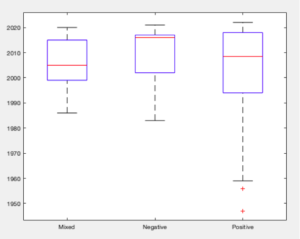 Bial wondered if there would be a trend over time in these movies, and we do see that Jewish characters have increased dramatically since the 1990s. And just as white actors used to play black and Asian characters, with a transition to people playing yellowface and blackface becoming a taboo, the same has not happened with Jews. While Jews are playing the Jewish characters, those characters are more likely to be weak or negative and strong and positive ones played by non-Jews.
Bial wondered if there would be a trend over time in these movies, and we do see that Jewish characters have increased dramatically since the 1990s. And just as white actors used to play black and Asian characters, with a transition to people playing yellowface and blackface becoming a taboo, the same has not happened with Jews. While Jews are playing the Jewish characters, those characters are more likely to be weak or negative and strong and positive ones played by non-Jews.
With the added visibility of these practices, it is important that more minority actors as well as Jewish actors are afforded these roles. Jewishness is not a religion — it is an ethnicity. Therefore, Jewishness cannot be impersonated by a non-Jew any more than being Indian by a Mexican; or Italian by a Norwegian; and certainly not a white person playing a Jew, an Asian or a Black character.
A link to the complete data set used for this article can be found at this link.
*
Sam Litvin, a Ukrainian immigrant to San Diego, is a world traveler, finding Jewish stories wherever he goes.